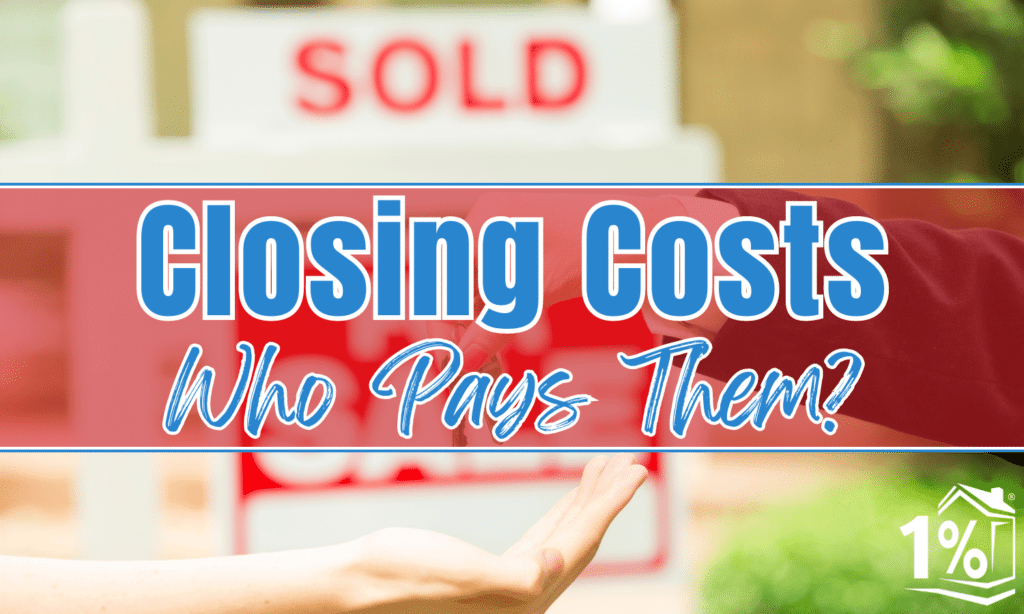Closing Costs: Who Pays Them?
Are you looking to buy or sell a home? You’re probably already aware of the major costs involved, such as down payment or repairs. However, there are other expenses to consider that are often overlooked. These expenses are known as closing costs and are essential to finalize the deal.
Closing costs are fees paid by both the buyer and seller, but the amounts and fees paid differ. If you’re a first-time home buyer, it can be confusing to understand who pays for what. We are going to explore the topic of closing costs in this article. We will clarify who is responsible for the costs and answer some common questions.
What are closing costs?
When a home sale is about to be finalized, there are expenses that need to be paid, known as closing costs. The exact amount and type of closing costs can vary depending on the location and type of property being sold. In this section, we’ll explore the common closing costs that are typically associated with all real estate transactions. We’ll also explain who is responsible for paying them and the different payment methods available.
Buyer costs
As a buyer, you’ll be responsible for paying for most of the closing costs out of pocket. Here are the typical expenses you can expect to incur:
- Attorney costs: Real estate lawyers charge an hourly rate for reviewing contracts and titles and drafting closing documents. Some tasks may have a fixed fee.
- Home inspection fee: If you have a home inspection done to assess the property’s condition, you’ll pay for it at closing.
- Appraisal fee: The bank requires an appraisal to estimate the home’s value during the mortgage application process.
- Underwriting/credit reporting fees: The lender may charge fees for running a credit check and performing other underwriting tasks.
- Prepaid interest: This is the interest that accrues between your closing date and first mortgage payment.
- Homeowners insurance: Lenders may require a homeowners insurance policy, and the first premium payment is due at closing.
- Title search fee and insurance: A title search and title insurance protect against any future issues with the home’s title. Lender’s title insurance is typically mandatory, but buyers can also purchase owner’s title insurance for added protection.
Seller costs
As the seller, you are liable for some of the closing costs. These costs are usually subtracted from the sale price of the home. Here are the typical expenses you can expect to pay:
- Realtor commissions: Both the buyer’s and seller’s agents receive compensation for their role in the home sale. Sellers usually pay a percentage of the final purchase price for both commissions. Choosing to sell a home with a discount broker can significantly reduce these costs.
- Title fees: These costs are associated with transferring the home’s title from the seller to the new buyer.
- HOA fees: If the home is in a community with a homeowner’s association, any outstanding fees must be paid at closing.
- Property taxes: If there are any unpaid property taxes, the seller must bring them up to date.
Although the buyer’s list of fees may appear longer, they typically pay less in closing costs overall. It is essential to remember that these expenses only include closing costs. The down payment is a different cost altogether.
How much can you expect to pay in closing costs?
The amount of closing costs can vary depending on various factors such as the location and type of property. As a general rule, sellers typically pay between 6% to 10% of the home’s purchase price at closing. Buyers can expect to pay between 2% and 5% of the sale price.
For example, if you were purchasing a $250,000 home, you could expect to pay closing costs ranging from $5,000 to $12,500. Meanwhile, if you were the seller, your closing costs would likely fall between $15,000 and $25,000.
Unfortunately, buyers may not know the exact costs until a few days before the closing. They should receive a closing or settlement statement about three business days before the closing date. This itemizes all the costs and the total amount they are expected to pay at the closing table.
Sellers, however, tend to have a more accurate estimate of the costs. An experienced agent will provide them with a seller’s net sheet. This is a list of expenses which were taken out of their total profit from the sale of the home. It gives them a fairly accurate idea of what they will receive from the sale once the final contract is signed.
The loan type makes a difference
Different types of mortgages can have a significant impact on the amount of closing costs a buyer pays. Conventional loans usually require buyers to pay between 2% and 5% of the home’s purchase price. Other loan types may have extra fees.
Buyers making a small down payment on a conventional loan might incur lender fees for insurance against default or delinquency. This would be due at closing.
Government-backed loans, such as VA and USDA loans, have one-time funding or upfront fees. FHA loans, on the other hand, require borrowers to pay an upfront mortgage insurance premium (MIP). This is typically equal to 1.75% of the total loan amount at closing, as well as ongoing annual premiums.
Additionally, private mortgage insurance (PMI) is required for buyers borrowing from a private lender with less than 20% down. Some lenders might ask for an upfront PMI payment at the closing. This means that an entire year’s premium is paid in one lump sum. It’s essential for buyers to consider these additional costs when choosing a mortgage type.
Tips for saving on closing costs
If you’re buying a home, closing costs can add up quickly and significantly increase your expenses. Fortunately, there are several ways to reduce these costs. Here are some tips to help you save on closing costs:
- Negotiate seller concessions: As a buyer, you can negotiate with the seller to pay some or all of your closing costs. These concessions can be offered in exchange for making home repairs or reducing the asking price. In some states, sellers are required to pay for title insurance policies for new owners. You can negotiate with the seller to include these costs in their concessions.
- Explore lender credits: Some lenders may offer to pay a portion or all of your closing costs. However, in exchange for this assistance, you will have a higher interest rate on your loan. This option can save you money upfront, but it may cost you more in the long run.
- Check for closing cost assistance programs: Several programs are available for low-to-moderate income or first-time homebuyers. These programs provide grants or loans to help cover your closing costs. Research and apply for any programs that you may be eligible for to save on your closing costs.
The bottom line
Closing costs are a significant expense for both home buyers and sellers. Therefore, it’s important to be aware of what to expect and negotiate where possible. Keep in mind, the type of loan selected can also impact closing costs. For this reason it’s essential to do research beforehand. By following the tips provided in this article, buyers can potentially save money on closing costs.
For those looking to buy or sell a home in Castle Rock reach out to 1 Percent Lists Mile High for expert guidance throughout the process. Our team of skilled real estate professionals can help you make informed decisions and achieve your real estate goals.
Contact us today to learn more about our services.



